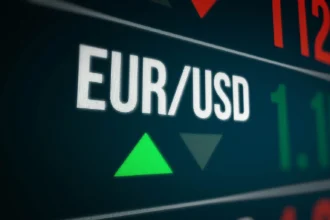Trump’s New Tariffs Send Shockwaves Through Global Markets
President Donald Trump’s latest trade policy announcement has ignited turbulence across financial markets, affecting everything from traditional stocks to cryptocurrencies. On April 2, 2025, Trump unveiled a sweeping set of tariffs during a White House press conference, imposing a 10% baseline tariff on all imported goods. Several countries face even higher levies: China at 34%, the European Union at 20%, and Japan and Vietnam at similar rates. Additionally, a hefty 25% tariff was placed on all automotive imports.
Immediate Market Impact
The response from global markets was swift and severe. Within minutes of the announcement:
- The S&P 500 lost over $2 trillion in market capitalization.
- The Nasdaq plunged 5.1%, while the Dow Jones Industrial Average fell nearly 10% from its December high, approaching correction territory.
- The German DAX index lost 1.8%, with major brands like Adidas, Puma, and Pandora experiencing losses of up to 10%.
- U.S. tech giants including Apple (-3.2%), Nvidia (-4.5%), Tesla (-5.6%), and Amazon (-2.5%) saw sharp declines.
Cryptocurrency Market Turmoil
The digital asset market also felt the heat, with a wave of sell-offs:
- Bitcoin tumbled 5.8% to $81,732.
- Solana, which was trading at $293 in January, plummeted 12%, hitting a 13-month low.
- Dogecoin lost 10%, while XRP slid by 7.4%.
Investors fled to stablecoins, seeking refuge from the volatility, while analysts pointed to heightened regulatory risks and global economic instability.
Global Reactions & Economic Concerns
The international community has strongly opposed Trump’s aggressive trade stance:
- China condemned the tariffs as “reckless” and vowed countermeasures, labeling the move a violation of global trade rules.
- European Commission President Ursula von der Leyen called the tariffs a “serious threat to economic stability.”
- The United Kingdom, which faces a 10% tariff, urged diplomatic negotiations but hinted at possible retaliatory actions.
Expert Analysis: A Global Recession on the Horizon?
Economists and market strategists are increasingly alarmed by the long-term consequences of these tariffs:
- Olu Sonola (Fitch Ratings): “This marks a radical shift in global trade policy and could lead to a full-blown global recession.”
- Ryan Lee (Bitget Research): “The tariffs have already triggered massive sell-offs in crypto, with Ethereum and Solana facing downward pressure.”
- Goldman Sachs: “We anticipate significant volatility in commodities, equities, and forex markets in the coming months.”
Future Outlook: What’s Next?
The financial world now braces for further developments:
- Stock and crypto market stability hinges on whether trade tensions escalate.
- The Federal Reserve’s next moves will be crucial in determining whether rate cuts can counteract recession risks.
- Investor sentiment remains fragile, with many reallocating portfolios to safer assets such as gold and U.S. Treasuries.
Frequently Asked Questions (FAQs)
1. Why did Trump impose these new tariffs?
Trump argues that the tariffs will reduce the U.S. trade deficit and encourage domestic manufacturing. However, critics warn of economic retaliation and inflationary risks.
2. How are stock markets reacting to the tariffs?
Major indices, including the S&P 500, Nasdaq, and Dow, have seen sharp declines due to investor fears of a global economic slowdown.
3. Why is Bitcoin falling amid trade tensions?
Bitcoin and other cryptocurrencies often react to macroeconomic uncertainties. The tariffs have increased market risk, leading to a broader sell-off in speculative assets.
4. Will the Federal Reserve intervene to stabilize markets?
The Fed may consider rate cuts if economic conditions worsen, though its ability to offset global trade disruptions is limited.
5. How could these tariffs impact consumers?
Higher tariffs could lead to increased prices on imported goods, affecting everything from electronics to automobiles.
Disclaimer
The information provided in this article is for informational and educational purposes only. It does not constitute financial or investment advice. Cryptocurrency investments and stock market trading involve risk, and past performance is not indicative of future results. Readers should conduct their own research or consult with a financial advisor before making investment decisions. We are not responsible for any financial losses incurred based on the information provided herein.



